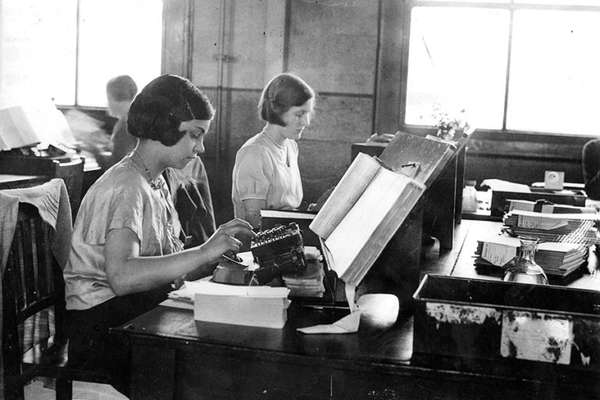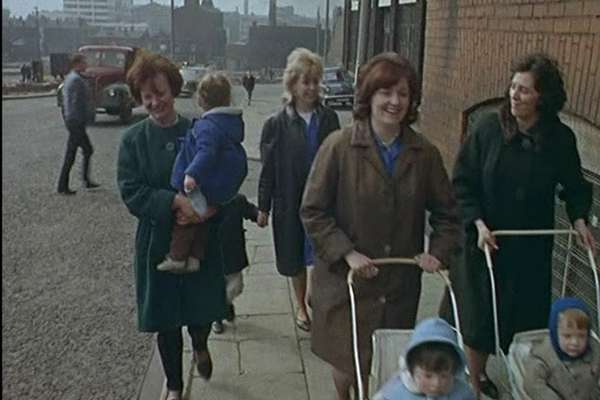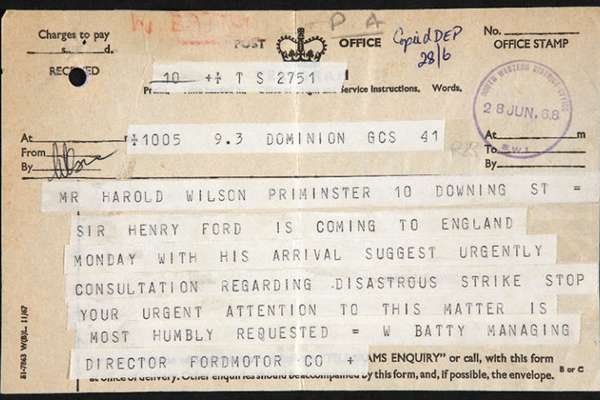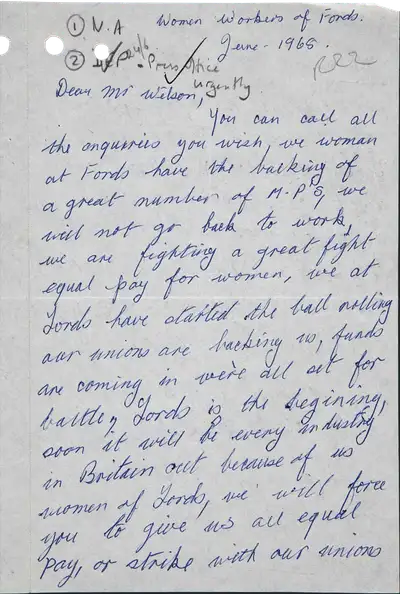Record revealed
A letter by the women workers at Fords of Dagenham
This handwritten letter was sent to the Prime Minister by sewing machinists at Dagenham car plant in the late 1960s, who were on strike for equal pay. It is collectively signed by the ‘women workers at Fords of Dagenham’.
Images
Image 1 of 3

Transcript
Women Workers of Fords
June 1968
Dear Mr Wilson,
You can call all the enquiries you wish we women at fords have the backing of a great number of M.P’s, we will not go back to work, we are fighting a great fight equal pay for women, we at Fords have started the ball rolling our unions are backing us, funds are coming in we’re all set for battle, Fords is the beginning, soon it will be every industry in Britain out because of us women of Fords, we will force you to give us all equal pay, or strike with our unions
Image 2 of 3

Transcript
blessings, we’re sorry for Fords, sorry for the men out of work but more sorry for ourselves its all for us now. Some women may be hard up we’ll help them from our growing funds, make no mistake most of us have husbands still working thats why we can fight you all, we are only our own money short, we will live. Give us what we want, not only us at Fords all Women everywhere, we refuse to go back, so what can you and the government & Mrs Castle & Jack Scamp do.
Image 3 of 3

Transcript
Nothing I mean nothing, we are sitting pretty our unions are backing us. Show this to Barbara, we don’t care M.P’s are with us, soon everyone will be with us we will make Fords shut down completely, who cares we dont.
Women Workers at Fords of Dagenham.
Give us what our unions demand equal pay.
Why this record matters
- Date
- June to July 1968
- Catalogue reference
- PREM 13/2412
This letter offers a unique first-hand perspective into the demands of the women sewing machinists at Fords of Dagenham. The action began on 7 June 1968, when 187 women walked out of Ford’s Dagenham plant, led by several workers: Rose Boland, Eileen Pullen, Vera Sime, Gwen Davis and Sheila Douglass.
The women were not asking directly for equal pay – they were asking that their technical skills used to make seat covers be ranked at the same grade as their fellow male workers. In their handwritten letter, they collectively articulate their demands and detail the support they had from unions and MPs, stating they were ‘all ready for battle’. The workers saw themselves as ‘fighting a great fight, equal pay for women’.
The letter survives in Prime Minister’s Office files on the subject, and sits alongside fraught letters and telegrams, showing how their message reached the heart of government. The women’s actions threatened complete closure of all Ford plants in Britain, impacting the motor industry and the economy.
While these women did not win their specific demands, they increased their rate of pay and succeeded in putting huge pressure on the Wilson government. Their actions acted as a significant catalyst for greater change for ‘all women everywhere’. On the back of the dispute Barbara Castle worked to pass the 1970 Equal Pay Act, which was ultimately limited in scope, but gave hope to women for further future change.
Blogs and podcasts
-
Blog
Fifty years since the 1970 Equal Pay Act

This blog explores the 1970 Equal Pay Act, the first piece of UK legislation ‘to prevent discrimination, as regards terms and conditions of employment, between men and women.’
-
Podcast
Video: Factory nursery in Liverpool

This Pathé film clip is titled ‘Factory nursery in Liverpool’ and shows a factory in 1965 that introduced free childcare for its workers.
-
Blog
The Archivists’ Guide to Film – Made in Dagenham

In this blog series, our staff write about favourite films that have a connection to documents we hold. The first film in our series: Made in Dagenham (2010).
